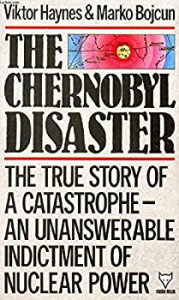The EL&SD EB is very pleased to repost this tribute by Chris Ford of the Ukrainian Solidarity Campaign. It is to Marco Bocjun, a leading Socialist from Ukraine. Before the war in Ukraine broke out, the Republican Socialist Platform, recognising the historical significance of Marco’s contributions, hosted a meeting to discuss his book, The Workers’ Movement and the National Movement in Ukraine, 1897-1918. Chris’s tribute points out that Marco broke from the orthodox and the dissident Communist (Trotskyist) tradition over the issue of Ukraine. He contributed to the ‘Internationalism from Below’ tradition, which EL&SD upholds. This had its roots in Poland, Ireland and Ukraine before World War One. This has even greater relevance today, with the world poised on the brink of direct inter-imperialist wars and a section of the Left trapped in Campist apologetics.
IN MEMORY OF MARCO BOCJUN, 1951-2003
Marko Bojcun, historian, political economist, and founder of the Ukraine Solidarity Campaign died on 11th March 2023 at the age of 72, after a long struggle with cancer. He was cremated on 23 March in a private ceremony with his family. I was introduced to Marko by the scholar Bohdan Krawchenko in 1985 when I first contacted the Ukrainian émigré socialist collective who published the journals Meta and Dialoh. I had the privilege of being able to consider Marko a friend and comrade for over 36 years.
Like many of his generation in the Ukrainian diaspora Marko’s parents were brought together in the aftermath of the catastrophe of World War Two. Originally from West Ukraine his parents had married in a displaced persons camp in Germany his mother had been in forced labour from 1944. His father had been involved with the military formations of the Organisation of Ukrainian Nationalists (OUN).
His parents moved from Germany to Australia, where Marko was born in 1951 where he grew up on a farm outside Newcastle in New South Wales. In 1968 the family emigrated to Toronto in Canada to be amongst a larger Ukrainian community.
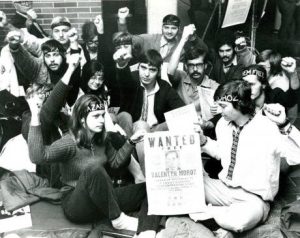
The year 1968 is considered a watershed, it saw the Prague Spring, the Tet Offensive in Vietnam, Civil Rights Movement, the mass strikes in France, there was global surge in radicalism. In this context Marko’s ideas and activism took a diametrically opposite direction from those of his father and that generation who had come to dominate sections of the post-war diaspora, whose ideas were shaped by the conservative integral nationalism that arose in inter-war West Ukraine – centred in the various wings of the OUN.
Marko’s democratic and socialist orientation were in many ways a re-connection with what had been the mainstream of the Ukrainian movement that existed before the OUN. In 1972 Marko was involved with students in a hunger strike in defence of Soviet political prisoners, and it was through this student activism Ukrainian new left took shape amongst some of the youth of the diaspora. In 1975 they began producing META, A Left-Wing Discussion Journal (in (English) and Dialoh (in Ukrainian) in 1977, which declared itself ‘For Democracy and Socialism in an Independent Ukraine’. They tried to pose an alternative to the conservatism of the old right in the Ukrainian Canadian community, and the Communist Party dominated Association of United Ukrainians.
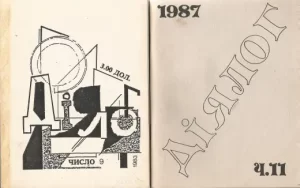
Marko was one of a number of the Dialoh collective who became members of organisations that were part of the Trotskyist Fourth International led by Ernest Mandel. The Meta and Dialoh collectives included a number of people who would become leading Ukrainian scholars, such a John-Paul Himka, Bohdan Krawchenko, and Halya Kowalsky a key initiator of the pioneering journal Labour Focus on Eastern Europe, and political figures such as Mick Antoniw, the only elected Ukrainian socialist in any parliament today.
Marko would write in these publications under the name of Taras Lehkyj, the first issue of Diloh containing articles by the older Ukrainian Marxists Vsevolod Holubnychy and Hryhory Kostiuk, alongside the Soviet Ukrainian dissident Leonid Plyusch, and prominent western socialist thinkers Ernest Mandel and Hillel Tiktin. This reflected in many ways the significant historical contribution made by Marko and his comrades, they were an historic link with the previous generation of Ukrainian socialists such as Ivan Maistrenko and Holubnychy who had survived Stalin and Hitler. This small left-wing element of the post-war refugees had established the émigré Ukrainian Revolutionary Democratic Party (URDP) and published for a decade the journal Vpered. The young new left would link up with this older generation, Marko personally new these veterans like Maistrenko and Panas Fadenko who in their own youth been active in the Ukrainian Revolution of 1917-1921.
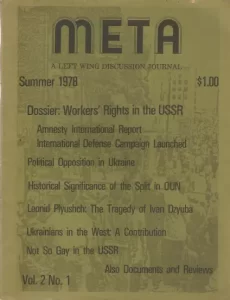
There was some consideration of the URDP being handed over to the new generation of the META/Dialoh collectives, but it never took shape, nevertheless, by this reconnection Marko and his comrades contributed to the very survival of the Ukrainian socialist tradition.
In META and Dialoh a range of historical texts of Ukrainian socialists were republished with articles by the older generation. In their publications and scholarly work, they kept alive a tradition which successive authoritarian regimes and narrow nationalists had sought to destroy.
In 1985 Marko had completed his PhD York University, Toronto, entitled the Working Class and the National Question in Ukraine 1880-1920. This was a pathbreaking study of the Ukrainian Revolution, I can remember Donald Filtzer Professor of Russian History recounting just how fantastic was a presentation that Marko gave at the time on his work.
In the late 1970s/1980s the Dialoh collectives were actively engaged in solidarity work for Ukrainian and East European dissidents and independent workers movements. With the onset of the independent trade union Solidarnosc in Poland in 1980 there was great hope for the process of changes unfolding, Marko was himself directly travelling to East Europe and later Ukraine, at first smuggling Dialoh and illegal publications.
For a period, Marko lived in Glasgow where he did an MA on Ukrainian Nationalism in the wartime period. This was also the time of the Soviet Union invading Afghanistan, the failure of the Fourth International to take what was felt a clear position against this led Marko and others to rethink their relationship to orthodox Trotskyism.
The 1986 Chornobyl disaster in Ukraine was a significant turning point for Ukraine and the USSR as a whole, and it was of importance to Marko. In 1988 he published jointly with Yaroslav Koshiw the book The Chernobyl Disaster, entitled an ‘An Unanswerable Indictment of Nuclear Power’ it remains a powerful critique to this day not only in the context of debates on energy and climate change, but the role of the Russian forces around the Zaporizhzhia Nuclear Power Station. The books concluding warning: ‘Unless we find another way to satisfy our energy needs, we must be prepared for what the people of Chernobyl have now tasted.’ Marko engaged further with Chornobyl in the making of a documentary film for British TV which involved him visiting the area, his exposure was possibly was the cause of his terminal illness in later years.
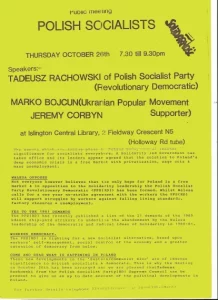
With the onset of Gorbachov reforms the Ukrainian national question again came to the fore and a national-democratic movement began to revive in Ukraine. Marko was active in supporting the new left in Poland and Ukraine, when we established a support group for the revived Polish Socialist Party, Marko was an active participant, and he was also published in their underground paper in Poland Robotnyk.
Marko wrote a number of articles at the time on the new workers struggles and national movement around the People Movement of Ukraine for Perestroika, known as Rukh founded in September 1989. When the miners strike swept the USSR in July 1989, Marko wrote a detailed analysis on the ‘Ukrainian Economy and the Miners Strike’, published in the journal Soviet Ukrainian Affairs arguing the ‘most important advance made by the miners in this strike is their self-organisation’. Indeed, it was these strikes which were the genesis of the current Independent Union of Mineworkers and Confederation of Free Trade Unions.
In 1989, we established in London the ‘Ukrainian Workers Solidarity Council’ in which Marko was the leading figure, it was engaged in correspondence with the new opposition groups in Ukraine such as the Lviv ‘Group to Establish Trust between East and West’, the ‘Lviv Social Democratic Organisation’. Their documents were amongst those translated and published in the newly launched journal Ukraine Today in January 1990, edited by Marko the new board included, myself (Chris Ford), Mick Antoniw, Yaroslav Koshiw, Halya Kowalsky, and Stefan Krywawych.
In 1991 Ukraine won independence, like elsewhere in East Europe it was not the independent Ukraine Marko had campaigned for in the previous two decades. Following this Marko held a number of academic posts, at the UCL School of Slavonic and East European Studies, he became the Director of the Ukraine Centre at the University of North London, and a Senior lecturer at London Metropolitan University, where he worked closely with Peter Gowan. His last post before retirement was professor at the New York University in London. Throughout the period Marko’s direct engagement with Ukraine continued, he was regularly travelling and undertaking in various projects in Ukraine.
Marko published two books which include his thoughts on this period of post-independence Ukraine, Ukraine and Europe A Difficult Reunion in 2001 and in 2020 Towards A Political Economy of Ukraine Selected Essays 1990-2015.
In the late 1990s a new left had begun to emerge in Ukraine, many would remain Marko’s friends and comrades until the end of his life, he attended an array of events organised or associated with the reborn Ukrainian left.
In 2011 Marko delivered a paper on ‘Soviet State, production mode and Social Formation: 1956 – 1986’; at a conference hosted by the innovative Visual Culture Research Centre at the Kyiv-Mohyla Academy organised by Olga Bryukhovetska. The following year Marko supported the campaign to defend the centre which was being subject to censorship by the University authorities with a prohibition of all events.
In 2013 Marko was then the subject himself of a more physical censorship himself by the far right in Ukraine. Marko had written the introduction to a small collection of Trotsky’s articles and speeches on Ukraine – Український Троцький published by the Left Opposition collective. As Marko wrote at the time: ‘
‘I am critical of some of Trotsky’s actions, but I cannot accept his demonization in the historical and polemical writings of Stalin’s apologists. This image has to be debunked. Unfortunately, Ukrainian nationalists have now joined the Stalinists in propagating it anew. And they share some of their methods.’
The launch at the bookshop “Ye” on Lysenko Street in Kyiv was wrecked by 20 thugs from the far-right Svoboda (Freedom) Party, the event had to be cancelled. Marko warned in his report Ukrainian far right attacks book launch of the dangers of a repeat of what was happening in Greece, asking: ‘Will it take a fatality, as happened in Greece, before people recognise what’s really going on here?’
2014 was a turning point for Ukraine with the popular rebellion of EuroMaidan. Seeing the retrogression on sections of the left and importance of these events Marko and myself decided in discussion with other socialists and trade unionists to launch the Ukraine Solidarity Campaign. It also brought together those old comrades from Dialoh such asMick Antoniw and Halya Kowalsky.
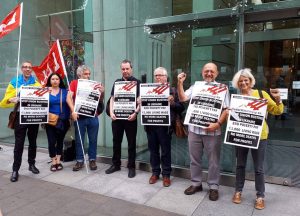
Marko was a pivotal figure in our campaign, publishing regularly and addressing countless meetings and events, in the UK and internationally. Perhaps more clearly than some he foresaw that Russia was going to directly invade Ukraine in 2014 arguing Putin would annex Crimea and intervene in Donbas. Marko’s clarity of analysis was just as sharp in 2023 – when he again argued Putin would launch an all-out invasion.
Following EuroMaidan Marko was very much in favour of a new party being launched by the left and trade unionists involved in the popular rebellion, he therefore welcomed the foundation of Socialny Rukh/Social Movement and had hoped it would develop into a new Ukrainian party of labour.
Throughout his writings from the 1970s onwards Marko had grappled with the Ukrainian national question, and he very much saw it as remaining a central question, especially after 2014. It was his view that for the Ukrainian new left to succeed in it should place the national question at the centre of its activities, rooting itself in the vernacular, Ukrainian socialist traditions. This was subject on Marko’s mind until his very last days. In observing the war unfolding Marko had come to the view that the historical process that began with the Ukrainian Revolution of 1917-1921 was being realised in the current popular resistance to Russian imperialism. Marko welcomed such developments as the turn towards the adoption of the Ukrainian language taking place from below in response to the invasion.
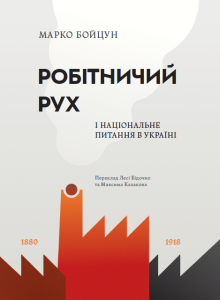
In 1999 Marko had returned to his study of the Ukrainian Revolution when he was asked to contribute to a special issue of the Journal of Ukrainian Studies, edited by John-Paul Himka, with a lead article by Vladyslav Verstiuk. Marko’s wrote an essay Approaches to the Study of the Ukrainian Revolutionarguing in response to Versiuk that: ‘Indeed, one cannot fully understand why at the turn of the twentieth century Ukraine’s economy was dependent and its social structure deformed—crucial parts of the explanation, it seems to me, for the relatively slow pace of its national maturation—unless we examine the quite contradictory impact of capitalist development in Ukraine upon its “modernization”.
Quoting Mykyta Shapoval, that the revolution had transformed the identity of workers Marko concluded this ‘was the most important achievement of the revolution. It made possible the renaissance of the 1920s, which in turn ensured that Ukraine’s inhabitants would participate in the economic and social modernization of the twentieth century as Ukrainians despite the almost complete denial of their political freedom.’
Marko would go onto to develop the study of the Ukrainian Revolution he had first outlined in his 1985 doctoral dissertation, despite his worsening health condition he worked tirelessly to complete his book The Workers Movement and the National Question in Ukraine 1897 – 1918 published in 2021. The first part of this was published in Ukraine in 2017, Robitnychyy rukh i natsionalne pytannya v ukrayini 1880-1920 and Ukrainian edition of his larger study was published in 2020 Robitnychyy rukh i natsionalʹne pytannya v Ukrainy: 1880–1918.
Marko made a major contribution to the study of the Ukrainian Revolution, through what he saw as his ‘attempt to disclose the relationship of the working class to the national question of that time’, he was the first to unearth the relationship between the division of labour and the Ukrainian national question.
Marko’s history was published at a pivotal time with the current war on Ukraine, it has provided us with a key text to help us understand the historical context of the Ukrainian question, of the colonial history of Ukraine and importantly that Ukraine has it’s own social democratic and socialist revolutionary tradition – refuting entirely the lie which portrays the struggle for national emancipation as created and led solely by reactionaries. On this aspect Marko was as sharply critical narrow nationalist schools as he was of Russian Imperialist views of Ukrainian history.
Marko saw particular importance in the recent work of John-Paul Himka Ukrainian Nationalists and the Holocaust: OUN and UPA’s Participation in the Destruction of Ukrainian Jewry, 1941-1944, and he considered that the political organisations of this generation who came to dominate the diaspora had failed to fully inform subsequent generations of the reality of their wartime role. Marko hoped very much to see a generational and political change in the leadership of the Ukrainian diaspora, with the new influx of modern Ukrainians displacing the old leadership with their conservative views rooted in the 1940s.
Marko did not cease his thinking and activism with the onset of the war and his worsening health, as the Russian army massed on the border Marko was with us at our protest at Russia Today TV station in London, he pushed himself to attend and deliver the message of Social Movement – to ensure there was a Ukrainian speaker at our Unions stand with Ukraine demonstration in April 2023. In the course of the war he produced a regular blog – War and Resistance Report for the Ukraine Solidarity website – reaching ten in total.
As the war unfolded Marko started to look to produce a second edition of his book The Workers’ Movement and the National Question in Ukraine, with a new section in which he addressed the causes of the First World War and refute those arguing that a new world war is imminent as a justification to not support Ukrainian resistance today. Sadly, he was not able to complete this planned text or second edition, and his tragic loss has denied us his analysis of this question and so much more that Marko wished to contribute to the cause.
Right until the end Marko was full of ideas for the cause, he was considering the need for a Ukrainian workers newspaper, that the Ukrainian populace are essentially social democratic in their views and there should be a united left slate in a future election, he was also enthusiastic about the ideas of Bohdan Krawchenko on cooperative housing for reconstruction.
Marko was never a dogmatist, he was an open minded and critical thinker, as a person a kind and generous man. Ukrainian activists in the West and in Ukraine can come to understand their history and development of modern Ukraine through writings of individuals such as Marko. His wealth of experience and research provide help us to understand with Ukraine today and to continue the solidarity work that Marko undertook over five decades of his life.
In his book The Chernobyl Disaster he gave me in 1988 he wrote: “For a world free of the ‘military’ and ‘peaceful’ atom”, he lived much of his life seeking contribute to create such a society fit for human beings to live in.
5.4.23
__________
also see:
Ukraine, Marxism and the National Question, a discussion with Marc Bojkun
EL&SD coverage of Ukraine since 2013
Why has Putin invaded Ukraine? part 2: A socialist republican analysis – Allan Armstrong


